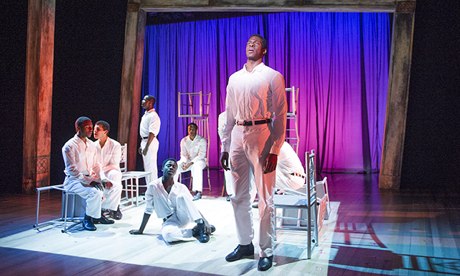The stage is barren save for a jumble of chairs. There's the tinkle of a band playing. Enter the cast: a white man dressed plantation-style, in a white linen suit and hat, two black men in garish clown garb, and nine black youths in the clothes of itinerant poverty. A sparkling, circus-style sign appears, reading "The Scottsboro Boys". A broad Southern voice announces that a tragic miscarriage of justice is about to be presented as a rollicking minstrel entertainment. Excuse me?
When a musical by John Kander and Fred Ebb on the Scottsboro case was first presented in New York in 2010, many in the city didn't like the idea at all. This horrific chapter of American history – nine black teenagers pulled off a train and falsely accused of raping two white women in Alabama in 1931, then subjected to Southern justice at its most criminally graphic – was far too serious to be presented in so cavalier and racially volatile a format, let alone by a white creative team. Theatres were picketed. Many theatregoers stayed away in protest.
But my Aunt Billie wasn't among them. Six years old when the boys were arrested in 1931, Billie has vivid memories of them and recalls the case dominating adult conversation. The "boys" – two as young as 13 – had hitched a ride on a boxcar, which was illegal, but it was also the Depression and folks did it all the time. No big deal, unless you were male and black and there were white girls in your car. "Miss Ann always cries rape," the grownups said. "All you have to do is look at Miss Ann [the black term for white women], and you wind up in jail if you're lucky, dead if you're not."
The case of the boys – their myriad trials and convictions, the threats of lynching even after one girl recanted, the assembly of mobs, the involvement of the Communist party – dominated the headlines of the black press, the Amsterdam News, the Pittsburg Courier, the Chicago Defender, all of which my grandmother and high-school teacher, Mamie, subscribed to and Billie read.
Mamie became a driving force among those supporting the boys in their hometown of Richmond, Virginia. With young Billie at her side, Mamie picketed, raised money and attended political meetings, trials and conferences. That first Easter Billie chose money for the boys over her new pair of patent-leather Mary-Janes. The boys became her boys and, despite passing years, they remained so. Little surprise then that she welcomed the show. At last the story of her boys was being brought back to light. Then aged 85, a veteran of the New York theatre scene for 65 years, she became one of its champions.
My own experience of the Scottsboro Boys – and I daresay that of many of those protesters – could not have been more different. My father, a year younger than my mother, didn't accompany the women on the picket lines. I grew up knowing of Emmett Till, but not the boys. Even during the intense political atmosphere of my university years, their case was rarely referenced. Was it because of the Communist party's involvement in the case? Were we loath to give a white-dominated organisation credit for their financial support and legal representation? Had the boys been too working-class or ignorant – and the case too sexually messy – to enter the approved pantheon of civil-rights martyrdom? Whatever the reason, my interaction with the show, which I saw in its Broadway transfer, was first of all in regards to its form.
White folks liked to claim that their blackface shows were affectionate creations, but we always knew better. The burnt cork, white clown lips and bug eyes, the white gloves, the watermelon-eating chicken thieves, the Aunt Jemimas, Uncle Toms, Uncle Bens, golliwogs, Amos and Andys, Beulahs, jive-talking cartoon crows and Black and White Minstrels – all were dehumanising, nothing less. The pain generated from this imagery cannot be overestimated.
Though all-black minstrel shows began to tour shortly after the American civil war, the basic formula remained unchanged. The paying audience was overwhelmingly white and they wanted their singing, dancing stereotypes. There was more freedom in stage performance than sharecropping, but straying from expectation risked financial and physical destruction where lynch law was the norm. Though a few entrepreneurial black people managed to penetrate the field, the vast majority of producers were white with financial and cultural investments in stereotype – so how to confront a musical using this device with any kind of open mind? Yes, Kander and Ebb had proven themselves politically progressive, psychologically perceptive and rapier-witted in such work as Cabaret and Chicago, but these were white shows. Could they be trusted with us? Or would their efforts smack of Fred Astaire's blackface homage to Bojangles in Swing Time – well-meaning but sick-making?
I needn't have worried. The Scottsboro Boys turns minstrelsy on its head. With one exception the cast is black, moving fluently between the bewildered youths that were arrested, the "boys" of minstrel expectation and the men they became; donning, mocking then discarding minstrel masques in the blink of an eye. Traditionally, it was taboo for black performers to play white characters: in this show, that's exactly that they do – by turns "benevolent", bungling, belligerent or frigid as dry ice, often emphasising the arrogance of white power. The score is memorable; the physicality of Susan Stroman's production takes your breath away, at once entertaining and disturbing, as a subject this challenging should.
In life, the Scottsboro boys were only fully exonerated long after all of them had died, when Alabama's governor signed a formal pardon in April 2013. On stage, I wonder if there could be a more apt telling of the travesty they endured.
• Candace Allen is the author of Soul Music: The Pulse of Race and Music (Gibson Square)









